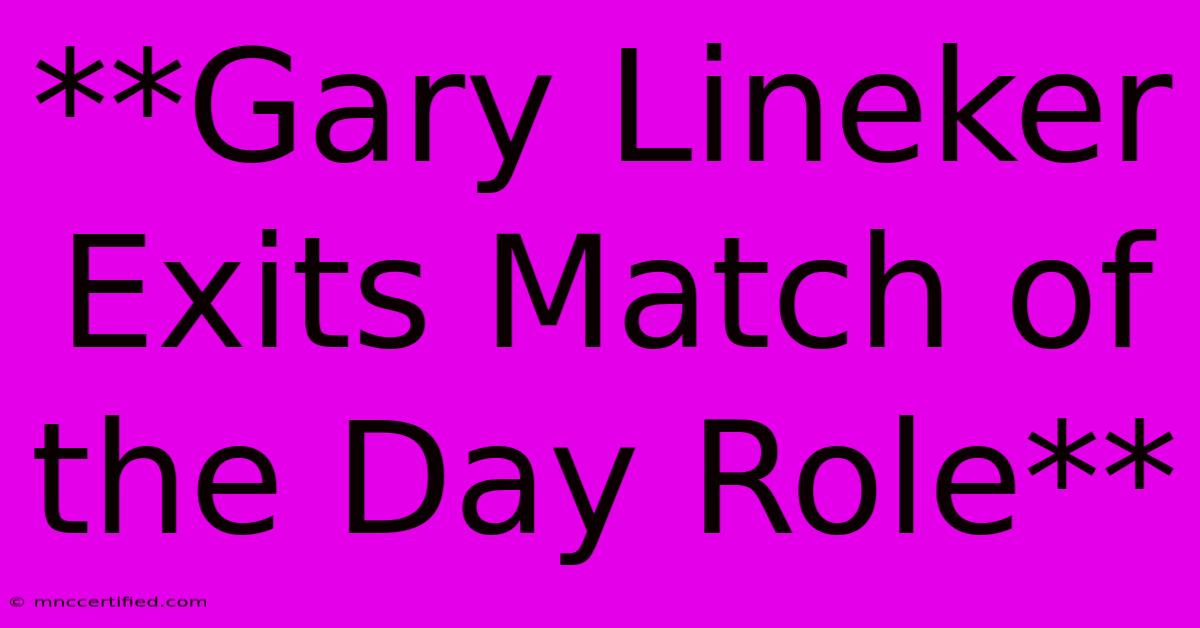**Gary Lineker Exits Match Of The Day Role**

Table of Contents
Gary Lineker Exits Match of the Day Role: A Controversial Departure
The world of British football was thrown into turmoil when Gary Lineker, a beloved figure and the face of Match of the Day for decades, announced his departure from the show. The news sent shockwaves through the sporting community, sparking a heated debate about freedom of speech, impartiality, and the role of public figures in the media landscape.
The Lineker Controversy: Social Media & Political Commentary
The controversy began with a tweet from Lineker, comparing the language used by the UK government to discuss immigration with that of the 1930s Nazi regime. This comment, though undoubtedly controversial, sparked a wave of criticism from government officials who argued that it was a violation of the BBC’s strict impartiality guidelines.
Following the backlash, Lineker was initially suspended by the BBC, leading to a mass boycott by other prominent presenters and pundits who refused to appear on the show. This unprecedented move demonstrated the immense support and solidarity Lineker enjoyed within the BBC, highlighting his significant influence on the network's image.
The Aftermath: Resignation & Ongoing Debate
After days of mounting pressure and a widespread outcry from viewers and the football community, the BBC announced a decision to reinstate Lineker. However, the agreement reportedly came with the caveat that Lineker would have to adhere to stricter guidelines regarding his social media activity.
Lineker ultimately decided to step down from his role on Match of the Day, citing a lack of trust in the BBC's ability to fairly manage his social media presence. This resignation sparked further debate, with many arguing that the BBC’s handling of the situation was heavy-handed and that Lineker’s right to free speech had been unfairly compromised.
The Impact: Future of Match of the Day & Free Speech
The Lineker controversy has left a lasting impact on the BBC, raising critical questions about the balance between impartiality and freedom of expression. It has also cast a shadow on the future of Match of the Day, a cornerstone of British sports programming. While the show continues, its future remains uncertain in the wake of the controversy.
The Lineker saga is more than just a footballing story; it is a stark reminder of the evolving relationship between media, politics, and the power of social media in shaping public discourse. The debate surrounding Lineker’s departure will likely continue for some time, raising vital questions about the responsibility and role of public figures in a modern, highly-connected world.
Keywords: Gary Lineker, Match of the Day, BBC, controversy, free speech, impartiality, social media, politics, resignation, football, sport, media, public figure, future, impact, debate, UK, government, Nazi regime, boycott, presenters, pundits, agreement, guidelines, trust, censorship, freedom of expression

Thank you for visiting our website wich cover about **Gary Lineker Exits Match Of The Day Role**. We hope the information provided has been useful to you. Feel free to contact us if you have any questions or need further assistance. See you next time and dont miss to bookmark.
Featured Posts
-
How To Get Out Of A No Bond Warrant
Nov 12, 2024
-
North Carolina Investment Properties
Nov 12, 2024
-
Philadelphia Special Event Insurance
Nov 12, 2024
-
Record Run Continues Stocks Gain Today
Nov 12, 2024
-
Parsons Mc Carthy Comments Misinterpreted
Nov 12, 2024